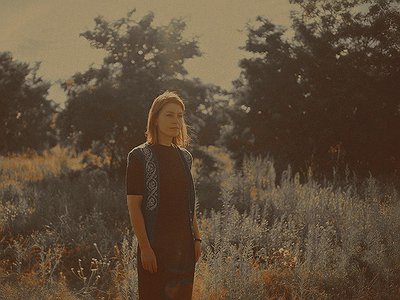Part 2
Could you describe your creative process on the basis of a piece or album that's particularly dear to you, please? Where did the ideas come from, how were they transformed in your mind, what did you start with and how do you refine these beginnings into the finished work of art?
What I am currently working on and am just about to finish is a quadraphonic composition titled FLOOD, that consists of three parts which ultimately form one piece. About 1 1/2 years ago I started to develop the idea and the feeling this piece should have. For this particular project I got inspired by a novel of Kazakh writer Chinghis Aitmatov called 'Cassandra's Brand', which is a dystopian futuristic science fiction novel about human kind's self-destruction. This came together with the thoughts that really started working in me about the current state of our planet, as I was intensively reading about environmental issues.
At this conceptional state, the ideas were rather abstract and I didn't really know in what direction it would go soundwise, but looking back I can say that I wanted to create a work that would incorporate beauty and destruction at the same time. I began collecting sound material, recorded sounds, instruments and voice and and was trying out and playing the synthesizer I had bought and wanted to incorporate for this work. I wanted to further explore the idea that the recorded material would be processed so it could sound sometimes almost like synthesized sound and on the other side to alter the sounds of the synthesizer in a way that it might at times sound like natural sounds. I think this was the most time intensive phase. So once I had the material, I arranged it and built the composition, which for this project was the most challenging part because with all the material I had collected I had already built a certain sonic image in my mind how I wanted this piece to turn out. That kind of vision took away a part of my freedom to make spontaneous decisions, so I needed to come back to a state where I could let the sounds to a certain degree unfold themselves, meaning I had to open up possibilities of change again. I partly worked with chance operations, but also let go of some ideas I had set for the structure and the mood of the piece, and that worked well. I am now in the last phase, I am mixing it, first for quadraphonic setup and after that I will do a stereo mix.
There are many descriptions of the ideal state of mind for being creative. What is it like for you? What supports this ideal state of mind and what are distractions? Are there strategies to enter into this state more easily?
One factor for me is that it is easier to get creative once the framework of the project has come together so I am not completely tapping in the dark anymore but also have a lot of space to develop ideas. Of course time is important too, ideally I have a lot of time to try things out but also a deadline that I am working towards.
For me the ideal state of mind is when I completely forget what I do and why I do it and just do it - you know just being in the process without yourself getting into your way with doubts or thoughts or comments about what you do. It is a bit like taking yourself out of the equation and just taking step by step into the direction that is right for your project. It is a fantastic feeling if it works, because then you're in the process without judgment and it just becomes what it is meant to become. This is definitely easier said than done, and I don't have a recipe for it. I try to listen to what I need and this can be simple things like sleeping enough or taking a long walk or just taking a break. So in the end it's a combination of outer structure and inner calmness.
How is playing live and writing music in the studio connected? What do you achieve and draw from each experience personally? How do you see the relationship between improvisation and composition in this regard?
I started playing live only recently because before I had presented my work in installation setups or as soundtracks or audiovisual fixed media pieces, so this is a very interesting area now for me to explore. Whereas previously playing live didn't influence my process of production, I am now thinking about it and incorporating elements of improvisation already in the compositional phase, so to keep a certain openness in the composition when performing it live later, without having to completely rethink it.
How do you see the relationship between the 'sound' aspects of music and the 'composition' aspects? How do you work with sound and timbre to meet certain production ideas and in which way can certain sounds already take on compositional qualities?
In my music those two aspects certainly cannot be distinguished. A sound only enters the composition when how it sounds is interesting to me. The process of altering sounds and noises so that they become what I feel is needed for the work is essential. At the same time, I don't distinguish between musical sounds and noises - the sound of rain falling or a voice pad or the hissing of a feedback loop are all the same to me, in the sense of their musical function.
Our sense of hearing shares intriguing connections to other senses. From your experience, what are some of the most inspiring overlaps between different senses - and what do they tell us about the way our senses work? What happens to sound at its outermost borders?
The strongest connection for me is the one of the aural and visual sense. Especially when I work on the soundtrack for a film, this becomes obvious but it is also newly surprising every time, because it is just astonishing what sound can do with image - it can open up a space that has just not been there before and it makes you see things in the picture that you haven't seen before the sound was there. That sound could also be silence. So this is also interesting for live performance again or in general for the presentation of music. We are visual beings, today more than ever I guess, so to consider the visual space and how it should to go together with the sonic space is really interesting.
Art can be a purpose in its own right, but it can also directly feed back into everyday life, take on a social and political role and lead to more engagement. Can you describe your approach to art and being an artist?
I do not want to convey any messages with my work, even if most of my pieces have a theme or sometimes might even tell a kind of a story. That's the beautiful thing about sound and music, it is abstract but at the same time able to create a strong atmosphere. If anything, my music is an invitation for the listeners to find a place within themselves that, I don’t know, offers a stillness maybe. I want my pieces to be a physical experience that allows the listeners to connect with themselves. At the same time, it's not necessarily about getting thoughts going, but maybe more about emptying yourself to just listening.
To achieve that, it is very helpful to create a physical space with an ambience that supports this idea - which is why most of my work had an installation character with a multichannel setup and included a visual concept. It definitely was inspiring that a few times, when I went to concerts or performances of more "experimental" character, I experienced them as quite hard to sit through - it made me think of what a visual concept could be and how the listeners are invited to enjoy the show, be it the kind of seating or the loudness of the concert and so on. There are so many different kinds of music, and I think a lot of the more experimental styles could do well with expanding the classic concert setup. To explore this I find very interesting. Sometimes it can really be a very simple thing that could be changed - like allowing people to move around or performing in darkness.
It is remarkable, in a way, that we have arrived in the 21st century with the basic concept of music still intact. Do you have a vision of music, an idea of what music could be beyond its current form?
I have never thought about that. Obviously technology will change and evolve, and with that the ways of music production change and how music can be experienced and consumed. But I don't have a future vision of music other than that I think as long as there are humans on this planet there will be music, too.






